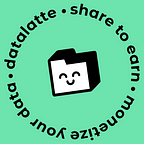Private data is valuable and getting access to it is not easy. Private data must be collected and processed following data protection laws such as GDPR (General Data Protection Regulations) and CCPA (California Consumer Privacy Act). Despite legislation data producers worry that their privacy may be compromised and that they may lose control of their data. Barriers like these make it hard for independent data consumers to get access to good quality data.
Compute-to-data helps solve these problems by changing the way data is accessed. Instead of sending the data to the computation process. The data remains in its original place and the computation is done in situ. This means that the data producer remains in control of their own data.
How Does Compute-to-Data Work?
Compute-to-data enables people to exchange data whilst preserving privacy because the data stays with the producer. However, it also allows 3rd parties to run specific compute jobs to get useful compute results like averaging or building AI models.
The data producer agrees to allow AI (artificial intelligence) algorithms to run their data. Algorithms are small instructions (scripts) that run on data sets under certain conditions within an isolated and secure environment.
So, in essence, the private data isn’t sold directly. Only specific access to it is sold. Think of it like this. We are in a coffee shop with our friendly dataBarista. Our dataBarista loads up the coffee machine with coffee beans. The coffee beans in this case represent data. The coffee machine processes the beans just like the algorithms process the data. What comes out of the coffee machine is the essence of the coffee bean. A flavor of the bean, not the actual bean itself. Compute-to-data works similarly. The result is a flavor of the data, not the raw data. Finally, because the algorithms view the data rather than humans, this ensures privacy.
Who are data consumers? Why do they need DATALATTE?
Data consumers may be research institutions, medical institutions, businesses or independent data scientists. Good quality data enables these organizations to make more efficient business decisions, discover groundbreaking new technologies or even create new medical breakthroughs.
DATALATTE will offer good quality data to these organizations at a competitive price. The aim is to open up access to data to a larger pool of independent data scientists. At the moment, access to good quality data is limited to big tech companies with deep pockets. DATALATTE would like to give data scientists the opportunity to create applications and products as freelancing businesses. So far the opportunities to do this have been hampered by big tech companies monopolizing access to data.
With DATALATTE data scientists will have more opportunities to build, create and develop.
Benefits of Compute-to-Data
- Control — Data providers do not lose control of their data because it stays with them.
- Privacy — Data privacy is maintained because only the metadata stays publicly accessible. Any reference to the actual data files is encrypted during publishing.
- Efficiency — Large datasets can be slow and difficult to move. With compute-to-data, the data remains in its original place.
- Regulations — Because the data producer maintains ownership of the data means it is easier to comply with data regulations such as GDPR
- Auditing — Compute-to-data algorithms can be audited, this adds credibility to the quality of the data analyzed
To Summarize
Compute-to-data represents a massive breakthrough in the way data producers and data consumers interact. Data owners can monetize their data with projects like DATALATTE whilst maintaining privacy and control over their data. Data consumers can access data without the risks involved in dealing directly with private data.
Other benefits of compute-to-data are that AI practitioners and data scientists can access valuable, private data that was previously unavailable. AI practitioners can also publish their own algorithms. This will allow them to earn passive income every time their algorithm is used. Compute-to data will inevitably lead to more accurate AI models and improved research.
If you’ve enjoyed this article please give it some claps, share it on your social channels and come visit us at https://www.datalatte.com/#/home
